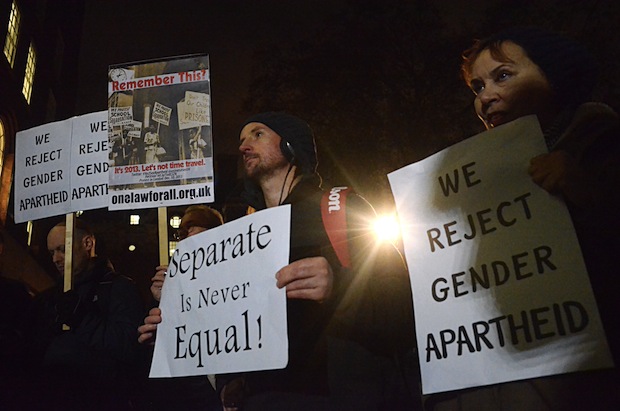Gender segregation: radical speakers cannot demand an audience that fits their prejudices
written for The Spectator, 14 December 2013

I spent much of Tuesday afternoon shivering outside the offices of Universities UK. I was there to protest their publication of guidelines which suggest segregated seating of men and women may be legally required where guest speakers demand it. It’s reassuring to learn that protest sometimes works: by Friday, the beleaguered body had shifted their position twice within 24 hours, thanks in part to criticism by Michael Gove and David Cameron.
But for all their fair words, I’m told the Cabinet have no plans for legislation to clarify the law. And I hear some members of the Islamic Education and Research Association, the group behind most confrontations over this issue, are agitating to launch a test case, heading to the European Court of Human Rights if necessary, to argue that their Islamist speakers do not enjoy freedom of speech unless they can speak to audiences segregated exactly how they like. Those who want Britain to stay in the EU, and committed to the ECHR, had better start hoping the ECHR come down on the side of common sense.
iERA has long promoted radical Islamism in universities, as Stand for Peace documents. The group insists separate seating areas for men and women don’t disadvantage women, so presumably their top speaker’s defense of a husband’s right to administer ‘a light beating to bring your wife to goodness’ is consistent with their stated commitment to gender equality. I expect death by stoning for homosexuality and adultery are equal-opportunity punishments.
Universities UK are a less brash bunch. Meekly, their guidelines mumble of ’a hypothetical case involving an external speaker invited to talk about his orthodox religious faith, who had subsequently requested segregated seating areas for men and women’. They’ve since cut this case study from the online report, so journalists can’t find it. But this isn’t some hypothetical we can forget about: as Nick Cohen notes, a notorious incident occurred earlier this year at my university, UCL. Meanwhile, the University of Leicester’s Islamic Society has been in the spotlight for routinely running segregated events, including several with the iERA.
Most such Islamic societies are affiliated to the student union, receiving funding and support. As I told Radio 4 yesterday, as a member of the same student union, I have a right to engage fully with the intellectual life of the campus. The ECHR protects my right to education regardless of sex – and as a woman, even if I’m allowed the privilege of a seat, I don’t engage intellectually on equal terms at an event whose organisers think I need to be kept away from men in public. Just sit back and think about how a culture of segregated seating areas would affect the number of women asking questions in the Q&A sessions. My opponent on Radio 4 compared this to single sex toilets – I’d argue most of us come to lectures to expose our intellects, not our genitals.
Basing your very seating arrangements on the belief that ‘male’ and ‘female’ are the fundamental categories of human existence is deeply discriminatory to transgender or intersex students – these fenced-off areas offend by their very presence, even if mixed seating areas are also available. I don’t actually believe I have the right to avoid being offended in this way. Sometimes, my university atmosphere won’t suit me perfectly – and I’ll just have to live with it. But if we allow speakers to demand an audience that fits their prejudices, we embroider their vision of their rights just as indulgently. As a practicing Christian, I hardly want to prevent students from praying together. But we can’t let iERA define free speech.




